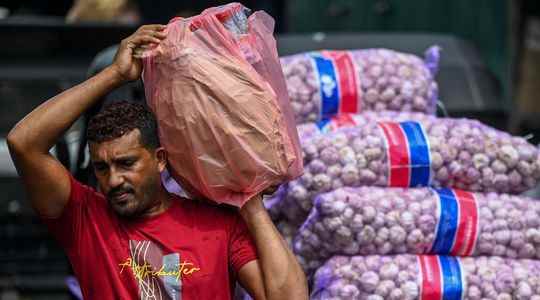Emerging countries are seeing their economies unscrew. On their shoulders the weight of the health crisis caused by Covid-19 and war in ukraine, which becomes more and more difficult to carry. Since 2020, 90 million people have fallen into extreme poverty, the first in more than twenty years, reports the World Bank. Barely extricated from the crisis linked to Covid-19, the developing States are now paying the price for the Russian invasion decided by Vladimir Poutinecausing food and energy prices to rise.
According to UN Secretary-General Antonio Guterres, more than a billion people are suffering the consequences of the war in Ukraine: riots in sri lankaflour shortages in Tunis, and rising prices in Peru.
For several months, Sri Lanka has continued its long descent into hell. A new Prime Minister has just been appointed with a view to forming a unity government to save an economy on the brink of the abyss. For weeks, this country has been rocked by demonstrations and violent clashes. The South Asian island of 22 million people is suffering from shortages of essential goods, daily power cuts and record inflation. The value of the rupee plunged more than 40% against the dollar from March. For its part, the price of gasoline is up 90% compared to the beginning of the year. There is no longer enough fuel to go fishing.
Tunisia and Sri Lanka “structurally vulnerable”
Since April 12, Sri Lanka has officially defaulted on its external debt, which amounts to 51 billion dollars. Like the former Ceylon, many states have seen their debt swell with the pandemic without having been able to launch major economic support plans.
Also in a difficult situation, Tunisia faces similar debt problems, which the war in Europe only aggravates. The small North African country imports a large part of its needs in soft wheat (84%), durum wheat (40%) and barley (50%), recalls Young Africa. While these imports come mainly from Russia and Ukraine, the price of bread has doubled. “The State no longer has the means to cover its financing needs, in particular the large subsidies to maintain the prices of energy and bread”, underlines to L’Express Meghann Puloc’h, country risk economist at the French Development Agency (AFD).
A vicious circle then forms: the heavier the debt burden, the less these States will be able to help their poorest citizens. “Tunisia and Sri Lanka are both indirectly exposed to the war in Ukraine and are suffering a financial shock, but these two countries no longer had access to international financial markets anyway (…) Structurally, they were already vulnerable”, continues the specialist.
Rising interest rates, a threat for the most vulnerable
The situation could get more complicated: inflation, which has accelerated due to blockages in supply chains, is pushing local central banks to tighten the screw. “Their objective is to try to curb the increase in prices. But this is problematic for the States which, no longer able to borrow on the international markets, resort to their domestic market”, adds the specialist.
Added to this is a sharper rise in US Federal Reserve interest rates. “For many emerging countries, the tightening of financial conditions will be a big shock,” Kristalina Georgieva, director of the International Monetary Fund, warned on March 22. It should be noted that the IMF is revising its forecasts for global growth sharply down to 3.6%.
In the meantime, not all countries are in the same boat. Some people’s exposure to food price inflation depends on their consumption and production patterns. Starting with Egypt, the most important destination for Russian and Ukrainian wheat. Bread consumption per capita reaches 130 kg per year, well above the world average. We can also see the domino effects of the crisis: in mid-March, Egypt announced that it would halt its own wheat and flour exports for three months “which will affect other countries, in particular Eritrea, Somalia and Yemen”, anticipates the European NGO Transport and Environment. It should be noted that food represents up to 60% of household consumption in low-income countries. In Peru, at the end of April, tension rose in this Latin American country. The population has indeed criticized the authorities’ lack of response to the social and economic crisis and strikes and social movements have multiplied.
World Bank economists and researchers from the National University of La Plata have analyzed the impact of food inflation on household welfare in developing countries. According to their study dated April 1, 2022 “consumers will be affected by the price increase, but sellers of wheat and maize will benefit. Logically, the end result depends on whether the household is a net buyer or a net seller of these food products: net consumers will lose while the net producers will be winners.” However, according to their study, the overwhelming majority of households (79.1%) in developing countries are net buyers of wheat and maize.
“We should provide support to these countries”
In such a context, what can emerging countries do? “They can take corrective action and offset some of the negative effects of rising prices by reducing tariffs on food products,” say World Bank economists and University economics professors and researchers. national of La Plata at the site Atlantico. For her part, Meghann Puloc’h once again mentions the case of Tunisia, believing that the only way out would be “the establishment of a program with the International Monetary Fund”. However, there are several pitfalls to this, starting with the social context which is particularly degraded and the need for a consensus between local actors.
“We should provide support to these states, the social and humanitarian issues are very strong. Financially, the default of payment by certain countries is not likely to threaten the entire economic system”, explains Meghann Puloc h. Whether in Tunisia, Sri Lanka or Egypt, the time is above all looking for alternatives, on the trade side.
